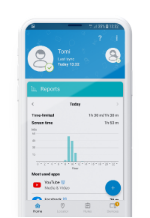Is your child's phone making them sick?
Gadgets provide immense learning opportunities and entertainment, but they have also introduced a new challenge for parents and educators: phone addiction among children.
To say that the internet and technology are important for business, commerce, travel, and communication is an understatement. The internet is everywhere, having permeated most aspects of our daily lives.
This is true for the younger generation as well, including even the youngest children. Walking by a restaurant table or family picnic and seeing little ones with smartphones in their hands is now commonplace. From the earliest age, children are exposed to and interacting with internet-enabled devices.
As it turns out, not all parents are happy about this trend.
In a series of online surveys1, the ESET team discovered that the majority of parents in four internet-savvy countries—Russia, the United Kingdom, Germany and the United States— think children are using the internet at far too young an age. Here is a closer look at some of the key results:
Interestingly, Brits appear to be the strongest adopters of parental control tools like ESET Parental Control for Android or ESET Internet Security among the four surveyed countries. As many as 73% of Brits stated that they use such a solution to monitor their children.
This is in stark contrast with the situation in Germany, where our survey revealed that 56% opt for non-technological means to keep an eye on their kids’ digital activities. This means that only 44% of German parents currently use technology to monitor what their kids are up to in the virtual world. By comparison, only 38% of parents in the United States said they don’t use any parental control solutions, followed by Russia at 44%.
Full ESET online survey results
|
|
Strongly Agree |
Agree |
Disagree |
Strongly Disagree |
|
UK |
23.9% |
40.5% |
31.7% |
3.9% |
|
DE |
33.5% |
31.8% |
26.3% |
8.4% |
|
USA |
27.3% |
40.5% |
27.0% |
5.2% |
|
RUS |
70.6% |
26.0% |
1.6% |
1.9% |
Do you use a Parental Control application to supervise your child’s online activities?
|
Do you use a Parental Control application to supervise your child’s online activities? |
Yes |
No |
|
UK |
72.8% |
27.2% |
|
DE |
43.8% |
56.2% |
|
USA |
61.7% |
38.3% |
|
RUS |
55.6% |
44.4% |
Where do you stand?
What children can access on the internet is clearly a concern, at least for parents in the four countries we surveyed. While many people think that children are "going digital” too early in life, there’s still a great deal that can be done to ensure their safety.
Beyond talking to children and manually monitoring their use of the internet, there are technological means to help them stay safe. ESET Internet Security includes a suite of parental control tools that can be used to limit what young children can access on the internet, while also letting them enjoy its beneficial aspects.
Do you think children are accessing the internet too early? After reviewing our survey results, what steps are you taking—if any—to regulate screen time for your kids?
[1]The Internet surveys used to gather these statistics were carried out in January 2016. A thousand respondents participated in each national survey, which targeted British, American, German and Russian participants. UK, US and German data were provided by Google Consumer Surveys, and the Russian data by Merku.


With ESET Parental Control for Android
Try free for 30 daysGadgets provide immense learning opportunities and entertainment, but they have also introduced a new challenge for parents and educators: phone addiction among children.
Together with child psychologist Jarmila Tomková, we've prepared some FAQs and common parental worries regarding excessive internet use. Find out why such habits might be problematic—after all, your children might not be the only ones in your household with these habits—and learn how to address and improve them.
Should your child spend all their free time online? Enjoy "Animalia", educational, interactive, animated series about child safety on the internet.